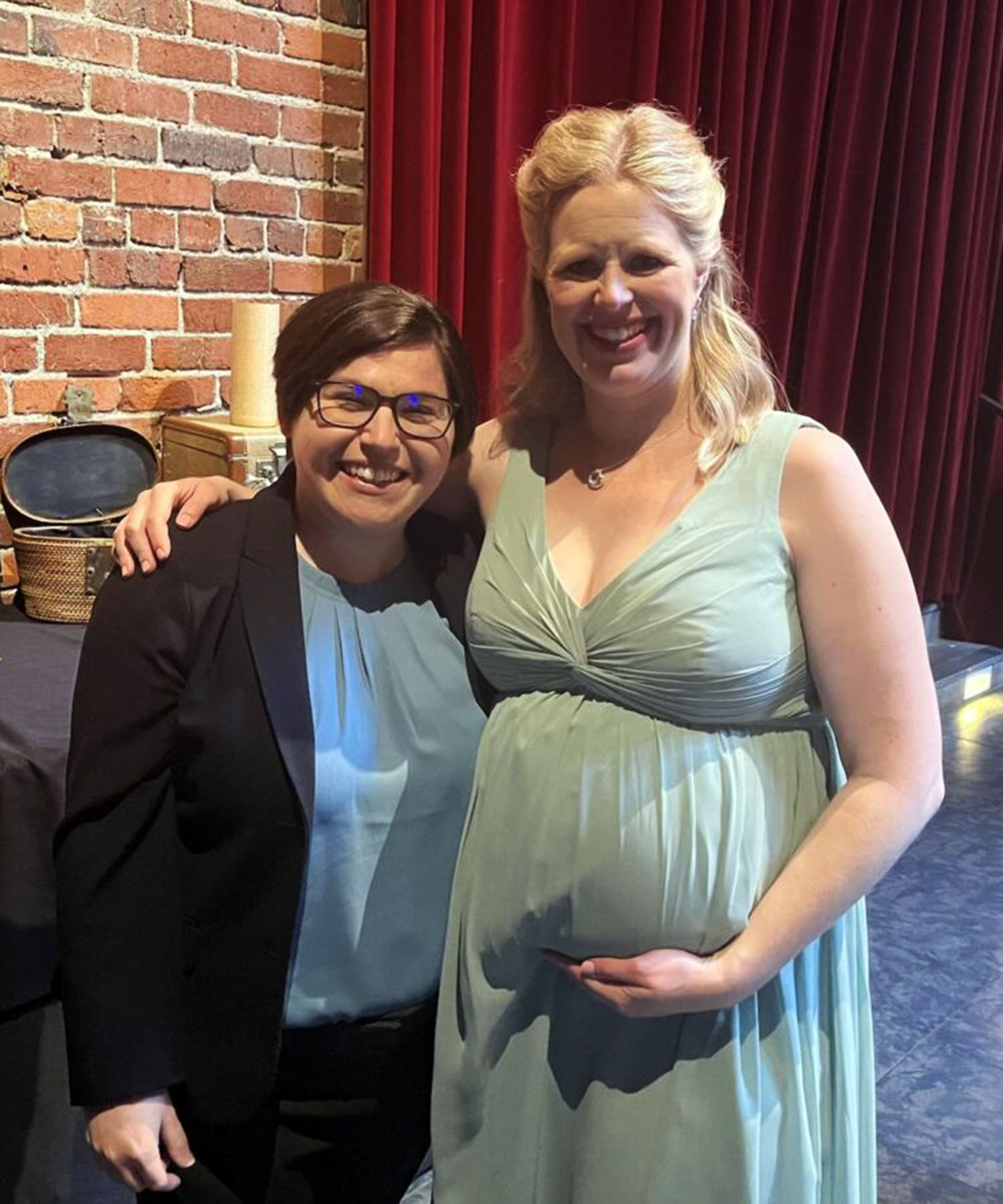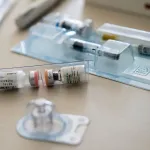When Erin Jackson was 35, she found out the dad who had raised her was not her biological father. The news shocked her.
“When my mom told me, I felt really excited and intrigued by the information at first, because as someone who’s a reader and a writer, I was like, ‘Wow, plot twist!’ I didn’t see that coming,” Jackson said.
Jackson began to look around on social media to connect with other people like her, who had been conceived by donors. She found a few groups on Facebook, but nothing quite fit her situation. So she made one.
It was 2016 when Jackson, a former food blogger, started the Facebook group “We Are Donor Conceived.” The group expanded into a website and a magazine, and Jackson used the group to conduct some of the first surveys of the priorities and feelings of donor-conceived people. Things have accelerated since then. In 2021, Jackson, who had no prior advocacy experience, joined a handful of other activists in starting the U.S. Donor Conceived Council, a political advocacy group.
Sen. Stephen Fenberg, the president of Colorado’s state senate, reached out to Jackson to ask what donor-conceived people want to see happen in terms of regulation of the fertility industry. Jackson was armed with data she had collected outlining the types of policy positions her community wanted to see. Fenberg ran with it: Jackson and the U.S. Donor Conceived Council were instrumental in shaping first-of-its-kind legislation in Colorado.
On Thursday, Colorado Gov. Jared Polis signed the first bill in the nation abolishing anonymous sperm and egg donation. Starting in 2024, Coloradans who were conceived by a donor will be able to find out the identity of their biological parents after turning 18.
There is no record of how many donor-conceived people are born every year, but estimates range from 30,000 to 60,000 in the United States. The fertility industry in the United States is barely regulated. There are no legal limits on how many children can be produced using one donor, and often there is no guarantee that donated sperm and eggs are from the people fertility clinics claim. The Colorado legislation seeks to change some of that: It limits the number of families an individual donor’s cells can be used for. The legislation received broad bipartisan support.
Jackson sat down with The 19th to discuss her work and what comes next in the world of donor-conceived activism.
This interview has been edited for length and clarity.
Sara Luterman: How did you come to advocacy? Learning you are donor conceived is part of that, part of who you are.
Erin Jackson: Five years after I moved to San Diego from Canada, I found out my dad isn’t my biological father. It was like hitting the reset button, honestly. My entire life starting over from scratch.
When my mom told me … I immediately ordered DNA tests. Mostly I was interested in finding out if there was anything health-related that I needed to know. When I got the results back, nothing on health came up. So at first I thought maybe it was a waste of time and money. There’s just nothing here. And then I clicked on the genealogy tab and saw someone listed as a half brother. I hadn’t even considered that possibility. I’ve met multiple half siblings at this point. I also was able to identify my biological father. I found out a lot about him. There’s quite a bit online that was available, because he was a writer. I got a good view into who he is as a person. That was super important to me. Not just to know what his name was, but to know what makes him tick, his interests and all of that. I was lucky enough to get that information.
I spent six months or so writing a letter to him. I wanted to make sure it wasn’t sending it in a state of shock, that I had some time to process everything before I put my whole heart out there to a stranger. It took two years before I received a response.
In vitro fertilization has existed since the late 1970s, and other forms of assisted reproduction have existed for longer than that. Why did donor-conceived people just start organizing in the United States now? We Are Donor Conceived only started in 2016 and the U.S. Donor Conceived Council only got nonprofit status this year. What was the spark?
For a long time, [assisted reproduction] was really covert. It was considered shameful. Certain religious leaders were speaking out against the practice and calling it adultery. The whole practice was shrouded in secrecy and shame. When I was conceived, parents were told to pretend it never happened. So most people who are donor conceived don’t know until they take a DNA test. [Lying] is more of an issue with heterosexual couples than it is with same-sex couples or single parents. There’s no shame around male infertility in that situation. A lot of the progress that’s been made in the [donor-conceived] world is thanks to queer families, because they’re smashing the stigma. I’m grateful for that.
I think this is happening now because of widespread, commercial DNA testing and social media. It’s very isolating, finding out you’re donor-conceived. It’s not talked about in popular culture. People think they’re the only ones. And then [on social media] they find this group of other people and realize that the feelings they have are normal.
DNA testing and social media created a community where people could strategize and come together. Even back in the early days of the Internet, there was a Yahoo! message board. There have alway been people who were donor conceived connecting with others, going back decades. But I think genetics testing helped us hit critical mass to make policy change.
People will take a test and immediately find 36 siblings that they didn’t know existed. It changes you.
What are the objectives of donor-conceived people when it comes to political organizing? What do people want? I know that We Are Donor Conceived has done some community surveys.
The most recent survey from 2020 was the most robust. One of the main things I wanted to ask about was what the community is interested in politically. The key things are good health information, ending anonymity and limiting the number of offspring. When the U.S. Donor Conceived Council was forming, and figuring out what our priorities were, we really drew on that community survey. We want to represent the broad interests of the group. Some of these priorities have been done in other countries. They’re not new ideas. It’s just another example of the U.S. being way behind on a human rights issue.
Colorado recently passed the first U.S. law regulating the fertility industry in a significant way. Can you tell me what this law means to the donor-conceived community?
The significance of the bill is that it recognizes that donor-conceived people exist, and we do have rights. And we have our own interests.
A state senator from Colorado, Stephen Fenberg, reached out to me directly. He said this seemed like something there should be regulations around, and asked if there was any effort to make that happen. He really wanted to make something happen and it developed from there. It was like getting on a train that was already going full speed. I’m still amazed by it. A lot of us thought there needed to be more regulation. But until Senator Fenberg reached out to me, I didn’t know where to begin.
Are there similar bills that are being considered in other states? What’s coming next?
We don’t have any formal plans yet. We’ve had people in our community reach out to us and say they want this to happen in their state. So we’re having some conversations about that right now. Ultimately, I am hoping that the bill in Colorado will be used as a template for other states.
What about federal advocacy?
We’re talking about it. But doesn’t it seem like the federal government is a bit of a mess right now? A federal law would be ideal, but you can’t even get people to agree to stop children from being murdered in school.
The support for the law in Colorado was incredibly bipartisan. Only a few people voted against the bill.
I was really surprised. I don’t know why it would be partisan, but that just happens so rarely these days. Because it’s not a partisan issue. It’s just basic human rights.
So what comes next? Or are you just celebrating this first victory?
I would just like to take a nap for like three months. But we’re already getting calls about doing similar bills in other states. One state is obviously a good start, but it’s not going to protect people across the country. So we’re just going to keep going and keep educating. Keep trying to create a better world for the next generation of donor-conceived people. Because none of this benefits me personally, at all. It’s all about people who don’t exist yet, which is admittedly weird.
Is there anything I didn’t ask about that you think is important for people to know?
I’m sure people are going to read this and think, “oh, that’s weird. What a weird little minority group dealing with a strange issue.” But most donor-conceived people don’t know it. People might be reading about themselves and not know it yet.







